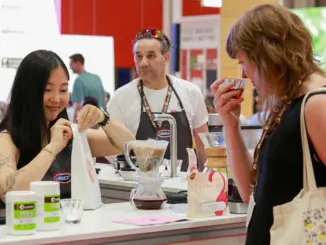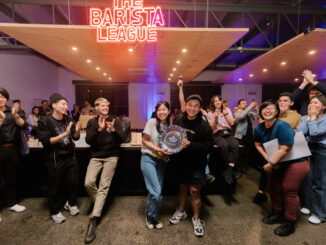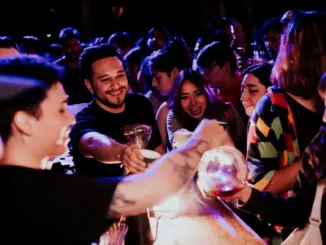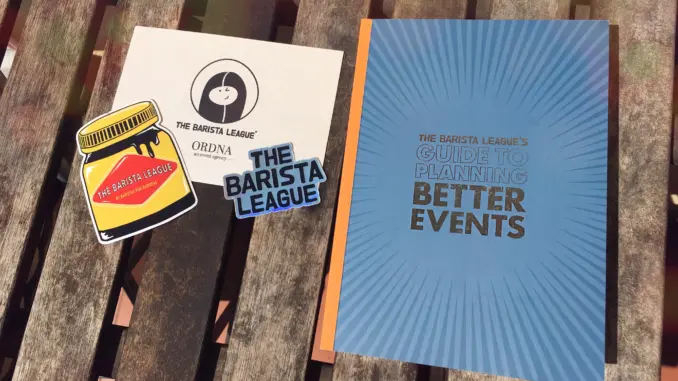
The Barista League’s Guide to Planning Better Events contains everything you need to organize a spectacular get-together, even if it’s not coffee-related.
BY TANYA NANETTI
SENIOR ONLINE CORRESPONDENT
Photos by Tanya Nanetti
The Barista League’s Guide to Planning Better Events is part manifesto, part handbook. The book, which collects many lessons learned from founder Steve Moloney after creating events for more than a decade, is something not to be missed—especially if you wish to plan the event you dream of.
Learn from the Pros
Whenever I organize an event in the coffee shop where I work—even a small gathering like a workshop, pop-up evening, or cupping—there are many little things that can (and will) invariably go wrong. From the right number of clean cups, to an inflated attendee list, to the involvement of a possible sponsor, there are so many unexpected things that can happen.
I finally had the opportunity to attend a Barista League event in March—and not a small one. It was the largest of their events so far, in Mexico City. I was truly amazed at how smoothly everything went! How was it possible that Steve Moloney and his staff were able to do such an amazing job?
Fortunately, I quickly found an answer in The Barista League’s Guide to Planning Better Events. It was written by Steve Moloney, along with TBL’s former communications director, Angela Ferrara.
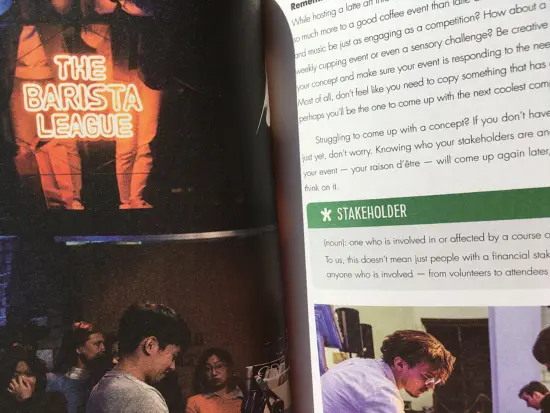
The Intro
At the beginning of the book, Steve briefly introduces himself and the path that led him to create The Barista League.
An Australian with a background in event production, he moved to Sweden in 2012 and eventually started working in a café. Three years went by and Steve was able to organize his first barista competition at the roastery where he worked; that’s when The Barista League was born.
Steve explains all the mistakes he made and the lessons he learned with event planning, including the most important one: You can’t do it alone.
Pre-Production Planning
The first section, “Pre-Production,” covers everything you need to know and do long before the date of your event. You certainly need to have a specific concept in mind, with a clear mandate and mission. You need to decide who you want to attract and why, working on inclusivity and access. (For example: “Is my community made up of baristas? Better organize something cheaper for participation, because they certainly can’t afford to spend much!“)
Calculate a realistic budget and figure out where and especially how to find the right sponsors willing to help. It is necessary to have a plan B in case something goes wrong, and possibly even a plan C. All this, and more, is covered extensively, supplemented by interviews with cool people in the coffee world.
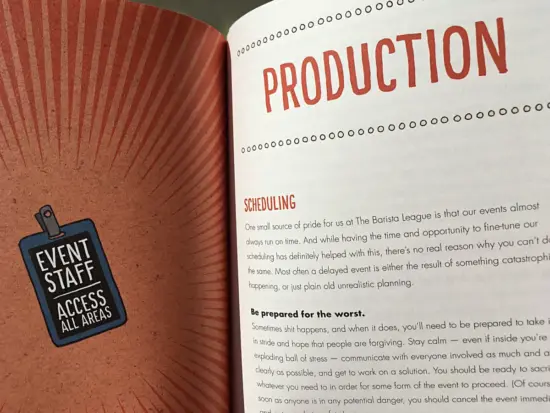
During the Event
The middle section, “Production,“ analyzes the event itself. Steve explains how to plan properly to make everything happen on time, how to properly control every detail, and how to write a detailed briefing to share with all participants.
And one of the most important tips, regarding staffing: Delegate everything you can and should, and pay what you can afford—these are key parts of a perfectly organized event.
When It’s Over
“Post-Production,“ covered in the third section, is “one of the most important parts of any event,“ according to Steve.
This section covers everything from writing a debriefing document (which includes, among other things, a brief summary of the event, statistics, photos, and examples of each sponsor’s brand presence), to remembering to pay yourself for your hard work in organizing everything, to the importance of basic business practices such as hiring a good accountant.
Finally, it is time to remember to learn from your mistakes, asking for feedback and humbly accepting both praise and criticism.
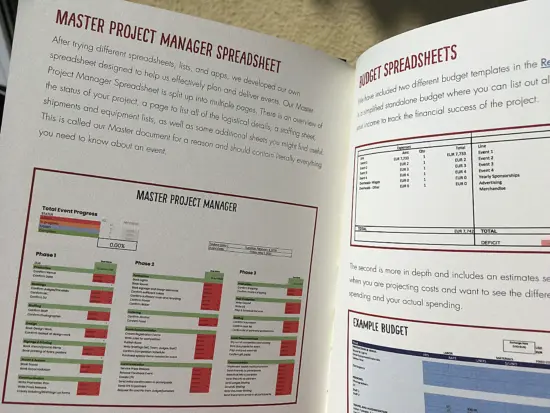
Additional Resources
The book concludes with a small section called the “Resource Kit.“ It presents a number of useful event production resources created and compiled by the TBL crew over the past few years, available (completely free) online. These resources, containing budget spreadsheets, templates, and useful references, can help you better organize your event.
A smooth, easy read, The Barista League’s Guide to Plan Better Events is a useful handbook that can help you plan something special, exactly the way you want, by giving you helpful hints and a list of all the things you need to consider when planning (and executing) the event of your dreams.
ABOUT THE AUTHOR
Tanya Nanetti (she/her) is a specialty-coffee barista, a traveler, and a dreamer. When she’s not behind the coffee machine (or visiting some hidden corner of the world), she’s busy writing for Coffee Insurrection, a website about specialty coffee that she’s creating along with her boyfriend.
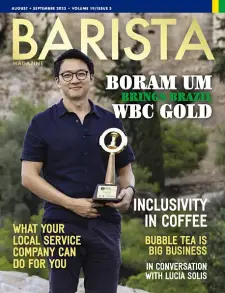
READ THE LATEST BARISTA MAGAZINE
Out now: It’s the August + September 2023 issue of Barista Magazine, featuring Boram Um of Brazil on the cover. Read it for free with our digital edition. Get your Barista Magazine delivered; start a subscription today! Visit our online store to renew your subscription or order back issues.


